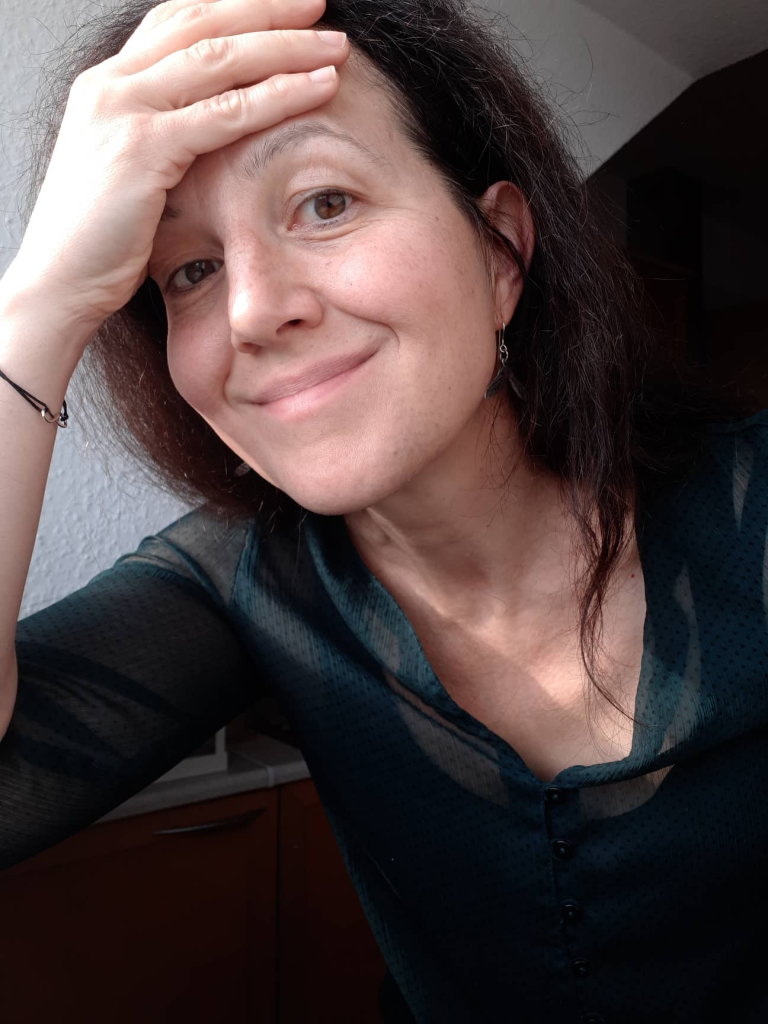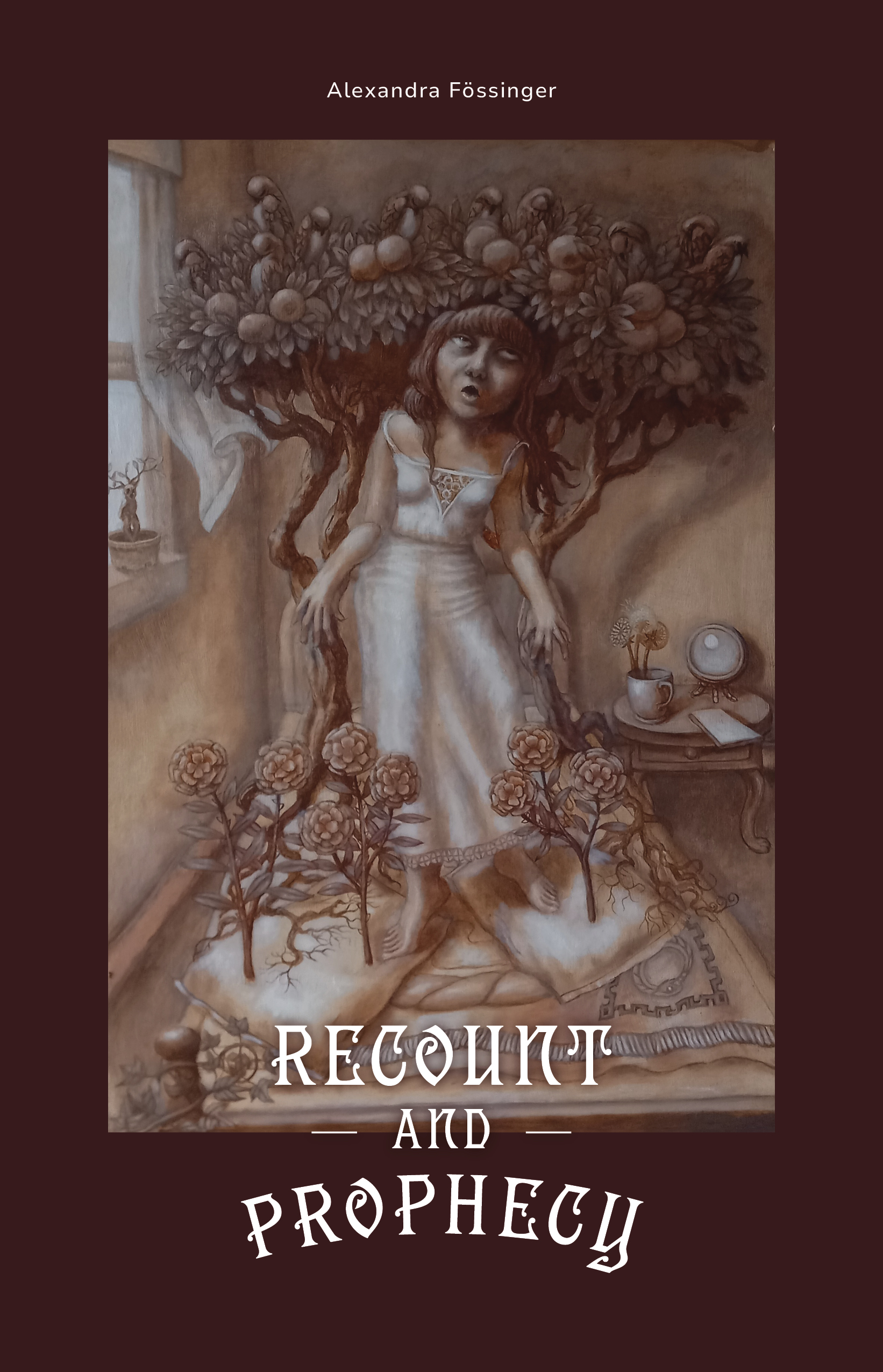Published December 16th, 2024
Review
by Agnes Fodor
“Here” is where Alexandra Fössinger will stay — with Viola, to whom she dedicated her new poetry chapbook Recount and Prophecy (Alien Buddha Press, 2024). Disconcertingly, Fössinger’s “here” rather sounds as “behind”: Her soul-realm is stuck, seemingly to comment on a perfunctory world that cannot fully cope with the assiduity of her minute poetic narratives. What remains is a deeply intuitive and morally inquisitive spirit agonised by the whirlwind burden of world-identities. And of those, Fössinger carries a unique set.
Content warning: The following review might be triggering to those struggling with body dysmorphia, self-harm, anxiety, and/or depression.
Fössinger’s mastermind exophony is akin to a jellyfish: It expands quickly in multidimensionality where soul-spheres dive (“dig, dig, dig, always / deeper” in “Abandon”), spread (into visual poetry in “Congenial,” “Changeling,” and “Dimension”) or attempt to roll away (as they wait “for time to unravel” in “Synchronicity”). This ever-pulsating quadripartite universe is adroit at its stations. Recount and Prophecy dances lightly and confidently forward in its almost narrative trajectory: from past reflections to world reflections to predictions to re-addition… of herself. While the first section, Recount, takes the first twenty poems with a presiding retrospection, The Middle Distance briefly bridges it with its not-at-all-light four poems to Prophecy (the ruler of the last twelve pieces). “Afterthought,” a maverick epilogue, stands at the end with one — additional — work titled “Self”.
Fössinger is clearly captivated by multifaceted and personalised mythologies: equal parts true folklore and body dysmorphia, all conducted by one aching, although well-poised spirit. The skeleton-sterility of “Changeling” (the exposition of the collection) doesn’t tolerate verboseness but is visually stretched, thus withholding the reader from escapism. This hauntingly claustrophobic vacuum is accented by the experience of a “body’s history” being “never entirely inhabitable” — under a title that in European folklore means the other, left behind as a substitute to the stolen human.

Fössinger’s far more classicist — and less body-horror — “Hecate” guards lines of an “oneiric gardener,” introducing thus a long line of poems with complex dream-land topographies. These evocative landscapes encompass scarcity and trauma, contrasting our usage of dreams as aspirations. In “Lund” “no one dares / to dream of the sea.” The explorations of “Abandon,” where the speaker of the poem is both “nightdreaming” and “daydreaming,” reaches conclusions in “Violent Dreams,” stating “The amount of love we deserve / is written in our bones / by somebody else. // Hold it at bay.” Although these dreamlands are non-material, non-external, they certainly are non-unreal: They hold a clear narrative progress throughout the chapbook.
Fössinger comes into her full power at perhaps the strongest section of the book: The altruistic four poems of The Middle Distance are responsive to the world's most pernicious social implications — the human psyche and rights. The speaker of “Europe, 2021” switches back from Swedish to Italian for “no language known to us works better / for swearing, after all,” and then, to claim a country “fragmented / by geography” that still “no one’s thought / of exiting,” not even during the pandemic. In “A water bath, well,” (with such ingenious titling!) Fössinger’s incredible sensitivity reaches its peak; the first-world guilt of having a bath clashes with that of third-world problems: “150 litres for which a girl (never / the boys) in, say, / Bolivia or Kenya / would have to walk.” The same guilt evolves into helpless compassion in “Lapus Lazuli”: Generational dissimilarity of locals over beach-vendor refugees, “iniquitous / geography,” and the debilitating memory of a refugee’s hoped-for Afghanistan cause heartbreak. Kudos to Fössinger for addressing European privilege — equal parts intently and softly.
Fössinger is simultaneously global and personal; even her power of trauma lies in her stinging themes of contemporary relevance. These issues of belonging often cover national identity lurching through a diverse set of countries (some ancestral in her Ars Poetica: Germany and Italy most of all — no surprise, for Fössinger is a native German and Italian). “Apfelstrudel” has one of the most harrowing personal sections of the collection: “All those holes / made by her even harsher, not-quite love, / quiet indifference, betrayed her lack of kinship / made it impossible to achieve an intact / Apfelstrudel, to attain belonging; // while I learned right there, how to be an orphan.” Similarly, “Queer” excellently touches on the personal account of being LGBTQ+ and facing sexism while putting a facade over being “invisibly delicate.” A cramped, although exquisitely obeying assortment of experiences placed in its grander mythological (and often ancient Greek) context (akin to Simone de Beavuoir’s The Second Sex: the female positioned both as “The Other” and into mythological contexts.)
Fössinger conducts an apparent love affair with sensory micro-verisimilitudes, for her chapbook often runs on precise poetic brevity; she presents an endearing mixture of abstract Western-ness and Asian poetic minimalism. “Congenial”’s young boy isn’t solely trapped in the barren linguistic day-care Fössinger built for him — “his very own circle of fire” — but also behind Fössinger’s ample usage of the vertical bar breaking and transforming the text into a discernible prison: The boy
“stood, alone, under a tree | clasping the
fence so tightly | his knuckles were about to burst.”
This smartly arbitrary semantic sphere not only makes readers gasp for empathy but air as well. An effect that “Dimension” plays equally well with its brevity similarly disrupted, this time by the interpunct.
Fössinger’s auspicious madness is scattered throughout her microcosms; her shortest pieces triumph with her oddly specific dexterities. “Forty-six”’s twisted birthday gift inventory consists of points that would deserve their own narrative explorations: plastic rainbows, Chinese poetry, her “lover’s list / of ten people he would like / to fuck” — just to mention a few. In “El mismo sueño” (a poem, once again, referring to Fössinger’s translingualism and dream-realm), few lines compress silent albeit alarming destruction confidently: “I see plankton in my pubic hair. / The water is quiet. / I keep my screaming inside.”

Yet, there’s something important to remember here: One might rule with poetic specificities, one with blunt simplicity may scathe. Recount and Prophecy, albeit graciously sliding through most of its poems, seems to slip on some of its more accessible ones; it attempts to please but only bluntness is pleasing — and accessible — for everyone. In the age of democratised media, the dangers threatening art are clear: Many pieces of poetry are so relatable that, by their nature, they refrain from saying anything particular. It is a clear problem of many (although not all) social media poetry. Fössinger, of course, has no reason to simplify her emotional topographies but still seems to tumble with — supposedly self-imposed — constraints: “The solid body / made liquid / by your voice / your words / enter me / like sex” (appearing and almost making the wholeness of “Airborne”) is, for example, only the seed of an idea — at its very best — one whose thousand different versions are merrily circulating out there (often printed on retail goods possibly thanks to their clichéd nature). A shame, for no real particle of Fössinger converges with such simplicity — or even remotely exists in the same universe.
The other point where Fössinger might be showing some unnecessary deference occurs when her otherwise dexterously built, linguistically more than adept poems soften exceedingly — and occasionally into forced semi-rhymes. This phenomenon trips up the otherwise consistent style of some of her works and may leave an aftertaste of amateurism from a poet who’s otherwise clearly proficient at her craft. The casual and unapologetically abstract “Synchronicity” concludes with abruptly abandoning its authenticity to “You grew a lunatic in that absolute / silence, / pretending there would be / a later. // But there you are, waiting / for time to unravel” — lines that unravel slightly too adorned and too soft to their excellently-manoeuvred previous roughness.
To be fair, we all would wish to be only occasionally fallible and merely due to deference (the only dark side of deep empathy?) — for it seems to be the sole obstacle in Fössinger’s way: something that could have been otherwise prevented by the editorial work of Alien Buddha Press (work that, for now, stands rather ambiguous as it either didn’t happen or wasn’t disclosed in the final product). As to editing, although Fössinger’s arrangement of the poems shows a clear vision that is certainly worth our attention, the section breaks not having been disclosed in the table of contents — but their relentless presence throughout the book — could make any conscious reading approach frustrating and may result first in furious page-flipping, then giving up on a more extensive understanding of her concept.
Eventually, landscapes, bodies and mythologies all still manage to have a glorious comeback in the last poem, “Gods of the misty lands,” under a quick quote from The Odyssey (with whose wanderings Fössinger apparently empathises strongly): “Listen; if we do not glide back / into original silence, / it will have us. / The Gods of misty lands reclaiming their place.”
And who’d dare to disagree with Fössinger when her daemon would please even Socrates?
Nationality: Hungarian
First Language(s): Hungarian
Second Language(s):
English,
German
Supported by:


Comments on "A True Poet of Her Daemon — A Review of “Recount and Prophecy” by Alexandra Fössinger"
Please log in to submit a comment.
Login